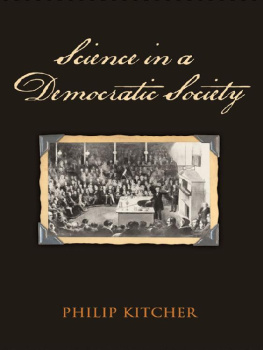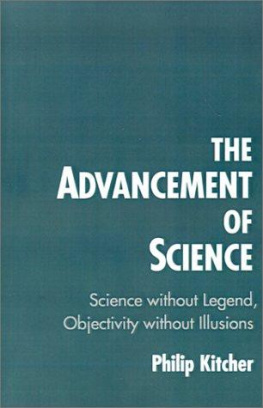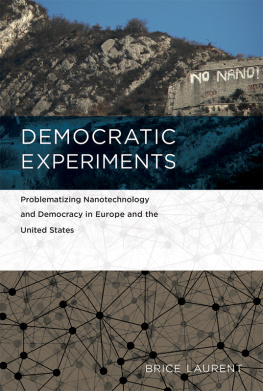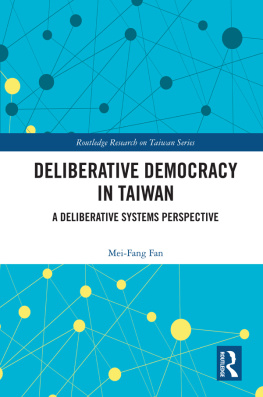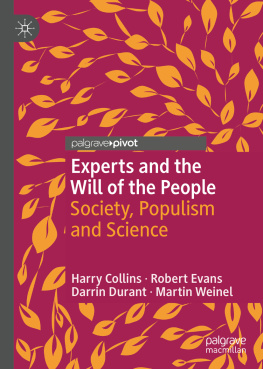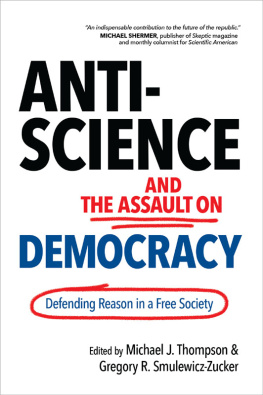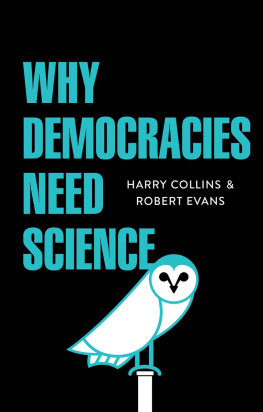
Kitcher's focus in this book is on a problem that is both practically urgent and intellectually challenging: how, given the current erosion of trust in scientific expertise, should a commitment to democracy shape the institutions of science and what role should scientific expertise play in democratic political decisions? Kitcher not only performs the invaluable service of framing the issues in a clear-headed way, he also points toward plausible answers to the questions he poses. By his own example, he shows how valuable the role of public intellectual can be.
Allen Buchanan, James B. Duke Professor of Philosophy
and Professor of Law, Duke University
Kitcher's new book is an outstanding contribution to the more recent social and political turn of philosophy of science. It's a stunning piece of work and the right kind of study we need.
Martin Carrier, professor of philosophy,
Bielefeld University, Germany
Not free inquiry, but the good of society democratically determined is the ideal by which science should be governed, argues Kitcher in this radical yet eminently reasonable book. Essential reading for anyone interested in science, science policy, or the future of the human race.
Michael Strevens, professor of philosophy, New York University

Published 2011 by Prometheus Books
Science in a Democratic Society. Copyright 2011 by Philip Kitcher. All rights reserved. No part of this publication may be reproduced, stored in a retrieval system, or transmitted in any form or by any means, digital, electronic, mechanical, photocopying, recording, or otherwise, or conveyed via the Internet or a website without prior written permission of the publisher, except in the case of brief quotations embodied in critical articles and reviews.
Cover design by Jacqueline Nasso Cooke.
Inquiries should be addressed to
Prometheus Books
59 John Glenn Drive Amherst, New York 142282119
VOICE: 7166910133
FAX: 7166910137
WWW.PROMETHEUSBOOKS.COM
15 14 13 12 11 5 4 3 2 1
Library of Congress Cataloging-in-Publication Data
Kitcher, Philip, 1947
Science in a democratic society / by Philip Kitcher.
p. cm.
Includes index.
ISBN 9781616144074 (cloth: alk. paper)
ISBN 9781616144081 (ebook)
1. ScienceSocial aspects. 2. SciencePhilosophy. 3. Values. I. Title.
Q175.5.K524 2011
303.48'3dc22
2011014989
Printed in the United States of America on acid-free paper.



S ince writing Science, Truth, and Democracy (Kitcher 2001), I have continued to think about the relations between scientific research and democratic values. During the past decade, I have given lectures and public presentations on related themes, and have published a number of articles. Along the way, I have often thought of developing my ideas more systematically.
An additional impulse to do just that came when, in 2006, I was awarded the Prometheus Prize by the American Philosophical Association. I am extremely grateful to Paul Kurtz, not only for his generosity in endowing the prize, but also for his extraordinary efforts over decades to advance the cause of secular humanism (I very much hope he will feel that this book is in the spirit of his endeavors). I am also greatly honored that the APA Committee on Prizes and Awards chose me to receive it.
In preparing the final version, I have been greatly helped by many people. During the past decade, my ideas have evolved through exchanges and conversations with Nancy Cartwright, Lorraine Daston, Isaac Levi, Helen Longino, and the late Sidney Morgenbesser. More recently, I have learned from comments offered by audience members at my Rotman Lectures (University of Western Ontario), my Baker Lecture (Rice University), and my Teale Lecture (University of Connecticut). For suggestions about an earlier draft, I want to thank Gregor Betz, Marty Chalfie, Lorraine Daston, Anna Leuschner, and Torsten Wilholt. The detailed commentaries offered me by Allen Buchanan, Michael Fuerstein, and Evelyn Fox Keller have enabled me to make considerable improvements. Discussions with Michael over many years, and with Evelyn more recently, have been exceptionally valuable.
I dedicate this book to a wonderful friend and interlocutor: Michael Rothschild.

A lthough it may not be a truth universally acknowledged, it is at least widely believed that the relations between scientific knowledge and the practices of the societies we think of as democracies are not what they should be. For some commentators, the problem is one of scientific pride, which seeks to override the values and the wisdom of the folk; for others, the trouble stems from public prejudice, which interferes with the proper translation of established knowledge into sensible policies. Whether the focal issues are the status of evolutionary theory, the proper use of molecular biology in medicine, the safety of genetically modified organisms, or the threat of global warming, people with starkly opposed ideas about what ought to be believed and what ought to be done concur in supposing the status quo to be unsatisfactory.
The chapters that follow treat these widespread attitudes as symptoms of a complex problem, that of integrating expertise with democratic values. The problem itself arises from many different causes: an oversimple view of inquiry, particularly scientific inquiry, as free of values and value-judgments; a conviction that fruitful discussions of values are impossible, and a consequent allergy to confronting questions about values directly; a superficial understanding of democracy that, in its crudest form, views democracy as achieved when people go to the polls and emerge waving ink-stained fingers in the air; a failure to understand that the system of public knowledge we have (in which the findings of the sciences occupy a specially privileged place), with its institutions and conventions, has emerged largely by happenstance, carrying with it residues of earlier states in which it was not expected to play anything like its present role. Only when these causes have been identified, and responses to them given, can one hope to offer a theory of the proper relation between expertise and democratic ideals.
I begin by reviewing some features of our current predicament, and by explaining why the picture of scientific research as a value-free zone is unwarranted. been engaged, for virtually all our history as a species, in the ethical project, a project in which we work out together how we should live with one another. Ethics is a social technology, one for which there are no experts. There is only the possibility of conversation, ideally free of factual mistakes and imbued with mutual sympathy.
Ignorance, whether accidental or intentionally induced, can lead them to act in ways diametrically opposed to their central interests. Public knowledge ought to offer remedies for these predicaments.
In , I trace the contingent evolution of systems of public knowledge. The current ways in which inquiry has been institutionalized grew out of the procedures of predemocratic societies and carry the traces of their past. Science as a community endeavor was not initially conceived as figuring in public life as it now doesit was not planned with its current part in mind.
Next page
